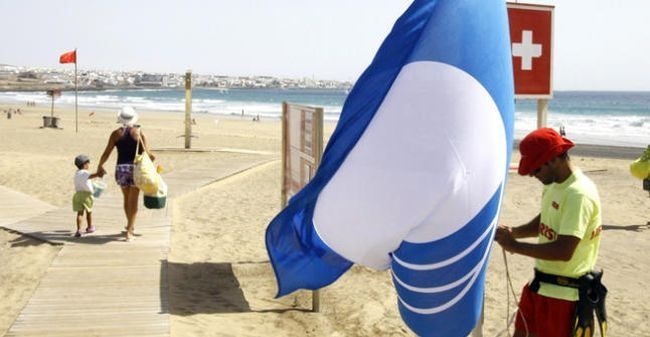Canary Islands will wear the ‘Blue Flag‘ badge this summer of 2019 in a total of 49 water zones, specifically, in 43 beaches and six ports, being the sixth community in Spain in which more blue flags will wave.
Tenerife Blue Flag beaches 2019
- El Socorro beach in Los Realejos;
- Playa Jardín Complex in Puerto de la Cruz;
- La Arena-Mesa de Mar de Tacoronte;
- Pools of Bajamar of San Cristóbal de La Laguna;
- Las Vistas and El Camisón de Arona;
- Playa and Calas de la Jaquita in Guía de Isora;
- Santiago del Teide in La Arena.
Thus, the award-winning beaches in the case of the island of Gran Canaria have been: Sardina in Gáldar; El Puertillo and Los Charcones in Arucas; Las Canteras in Las Palmas de Gran Canaria; Hoya del Pozo, Melenara, Salinetas and La Garita in Telde; The Burrero in Ingenio; the beach of Arinaga in Agüimes; and in San Bartolomé de Tirajana the beaches of San Agustín, Maspalomas, Meloneras and El Inglés.
On the island of Lanzarote, the blue flag will sport the beaches of Las Cucharas and El Jablillo in Teguise; Del Reducto in Arrecife; in Tías those of Matagorda, Los Pocillos, Blanca and Pila de la Barrilla; while on the island of Fuerteventura it will wave at Playa Blanca, Puerto Lajas and Los Pozos in Puerto del Rosario; and in Tuineje in Tarajalejo.
As for the island of La Palma, the blue flag will fly at Bajamar in Breña Alta; in Los Cancajos in Breña Baja; in Puerto Naos and Charco Verde in Los Llanos de Aridane; and in Tazacorte in El Puerto.
Finally, on the island of La Gomera, the distinctive will be on the beach of San Sebastian and La Cueva, which is incorporated this year, in San Sebastián de La Gomera; and Santiago in Alajeró; while in El Hierro it will wave at La Restinga in Pinar del Hierro.
Spain gets 669 Blue Flags in 2019
In the national set, Spain has obtained a total of 669 ‘Blue Flags’ (566 beaches, 98 marinas and five tourist boats) that will wave from June, which is a decrease of 28 compared to last year although it remains the leadership at world level. More than 100 ‘Blue Flags’ have been wearing in Spain for ten or more years and seven Spanish beaches debut their banner this summer.
By communities, the Valencian Community is the one with the largest number of flags this summer (150 in total), followed by Catalonia (120 flags), Galicia (119 flags), Andalusia (98 flags), Balearic Islands (63), Canary Islands (49) ) and Murcia (31). Behind are Asturias (13), Cantabria (eleven), País Vasco (five), Melilla (four), Extremadura (three), Madrid (1) and Ceuta (1).
For Secretary of State for Tourism, Isabel Oliver, present at the event, this decline “is not a drama” but is a fact that will improve the beaches. “This decline is said to be this distinction, it is not ‘blue flags for all.'” These requirements are very demanding and denote a concern for the preservation and care of these beaches, and I can see this positive reading for both residents and visitors. \ “, Oliver said.
In his opinion, the ‘Blue Flags’ give a good image of Spain as a tourist destination and help increase its competitiveness, in line with sustainable development strategies. “The goal is for Spain to be recognized as a great destination for responsible tourism by both visitors and residents,” the Secretary of State justified.
The number of award-winning ports remains practically stable. It leads Catalonia with 23 winners, followed by Andalusia with 17 ports, the Balearic Islands with 16, the Valencian Community with 15, Galicia with 12 and the Canary Islands with six.
In first aid and first aid the award-winning municipalities have been Almería (Almería), Mijas (Málaga), and San Bartolomé de Tirajana (Gran Canaria); in Environmental Education, Chipiona (Cádiz), Palma de Mallorca (Mallorca) and Torredembarra (Tarragona) are awarded. Finally, in inclusive beaches, the winners were Arnuero (Cantabria), Chiclana (Cádiz), and Lloret de Mar (Girona).
The data has been released on Tuesday in Madrid by the Association of Environmental Education and Consumer (Adeac) – the Spanish section of the European Federation of Environmental Education – which ensures that beaches, marinas and sustainable boats Spain still maintains the first place in this world ranking.



